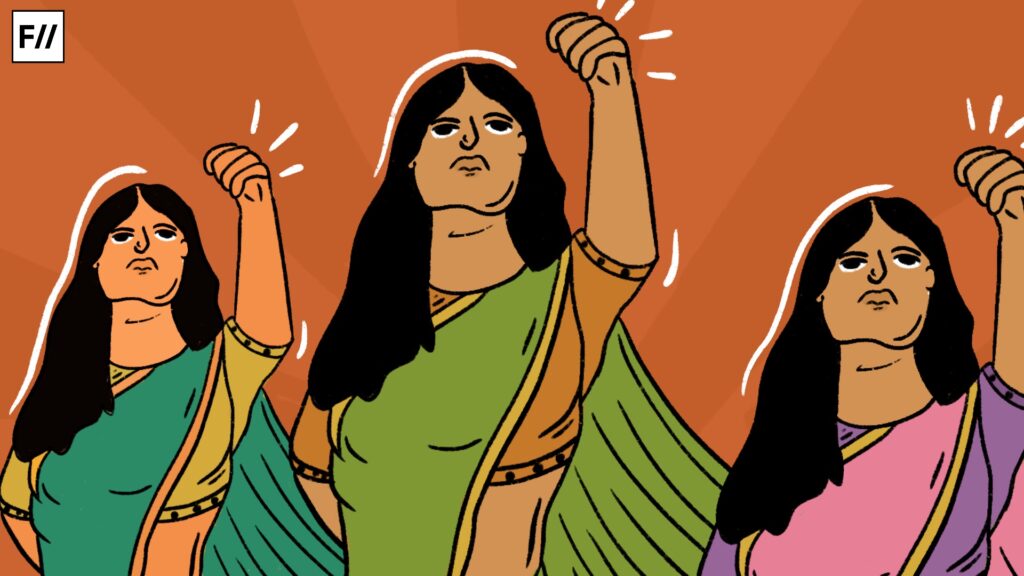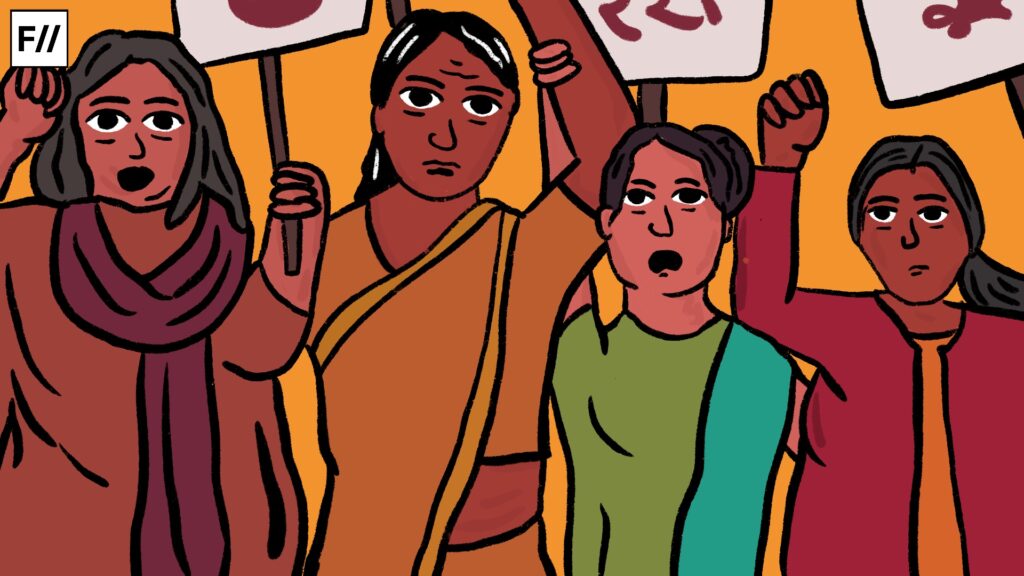History– and our understanding of it– acts as the bedrock for our perception of the world we live in and history, as taught to us, is hegemonically dictated. In being so the histories & realities of the other are suppressed, creating a standardised view of the past (and invariably, the present) for society at large. Narratives of feminist histories exist on the margins, as a supplement to general social history.
While institutions & individuals have made attempts to platform marginalised voices, the root of the existence of a standardised, uniform history lies in how historiography itself is structured. Feminist historical materialism brings effective structural change to reading history by reframing how we look at the past, by looking at it from a counterhegemonic point of view.
Feminist history as counterhegemony
Feminist History is the alternative understanding of history through the perspective, specifically, of women. Through feminist history, we understand social formation with an emphasis on gendered experiences, which are otherwise often sidelined. It changes the rhetoric of how we see the world around us, allowing for a more inclusive & distinctly-critical view. And as alternative historiography, it becomes counterhegemonic.*

Women’s perspectives of histories, as well as their experiences of living through– and being involved in– historical events are often unrecorded. Thus, much of feminist history & historiography is rooted in oral history, passed on informally.
Scholar Stephanie Ruel in her paper explaining feminist historigraphy says, “By untangling these ‘grand narratives’ of history and by looking for more complex and fragmented meanings and lived experiences, we can arrive at a more nuanced and varied understanding of our histories and cultures.” An essential part of understanding these nuances is in examining social dynamics, brought in by feminist historical materialism.
Understanding historical materialism
Historical Materialism in itself provides an alternative outlook to approaching history. Propounded by Karl Marx in ‘The German Ideology,’ historical materialism views history through the interactions of social classes based on economic conditions. It presents the argument that society evolves through struggles between classes (and its resulting radical change) rather than social progression by so-called great men or their regimes. It also emphasises the role of the material world & the process of production in dictating societal evolution.
So, according to Marx, the continual struggle between the proletariat and the bourgeois, for example, results in socio-historical change; thus, centring the role of revolutions in the development of history. This outlook broadens our understanding of history and distributes the merit of social evolution beyond a select few.
Applying socialist feminism to historical understanding
Feminist historical materialism (FHM) reconstructs Marx’s ideas to fit the feminist context and brings a gendered perspective to history shaped by social dynamics. It aims to bring to light the role of women’s reproductive labour as a legitimate part of the productive forces that have shaped (and continue to shape) society. Within the larger umbrella of feminist historiography, FHM provides a more directed approach that helps dispel potential criticisms of obfuscation, which can arise as seen with feminist history’s sister subject subaltern studies. It thus acts as a clear and guided slant to analysing history from a feminist perspective.

Further, it helps bring in the critically important but equally undermined role of women’s unseen labour not only within the larger scheme of the economy but also in social development. FHM can also be used to explain why gendered social structures are the way they are. Political theorist Colin Farrelly in his paper titled “Patriarchy and Historical Materialism” incorporates reproductive labour into Marx’s theories on relations of production to explain the foundation & persistence of patriarchy. He links the sustenance of the patriarchal structure to the sexual division of labour and also holds larger sociopolitical phenomena, like the resource curse– a theory that posits the underdevelopment of resource-rich countries to the exploitative first-world– responsible for the same.
So while FHM has the potential to help us better understand our world, both Historical materialism itself and feminist historical materialism remain confined to theoretical & Marxist academic spaces rather than having practical application within historiography at large.
In favour of championing feminist historiography
It is easy for women’s histories to be overlooked and they often tend to be pushed to the background. Moreover, feminist history is viewed as detached from mainstream history. In conversations about the freedom struggle, we hear mainly of the men who fought for our nation and rarely ever of the women who did too.

In conversations about both environmental development & degradation, movements like the Green Revolution receive much more traction than women-led grassroots movements– with this too, movements like Chipko receive much larger attention than lesser-known ones like the Adivasis struggle against forest regulations. In conversations about women’s development, even, we hear more of Raja Rammohan Roy and Swami Vivekananda than of Savitribai Phule.
And, while all this is so, the invisible labour of Indian women and their constant & continual toil of cooking, cleaning, caring gets pushed under the rug. Furthermore, when it comes to domestic labour held up by the millions of, more often than not Dalit-Bahujan, domestic workers, their contribution of (quite literally) being the backbone of our country’s day-to-day functioning goes unacknowledged. The lack of acknowledgement of these forms of labour, beyond simple invisiblisation, leads to them being taken for granted and only exploited & oppressed further, due to the lack of structural recognition & support.
Alternative histories, especially those existing primarily orally, hold a lot more importance than given credit for. They embed & fuel radical change, in turn, helming larger social change. To understand our world beyond pre-existing hegemonic narratives, it is imperative we approach history from an inclusive, intersectional feminist perspective.
*counterhegemony is loosely defined as resistance towards hegemony, especially with the intention to replace it.
About the author(s)
Spoorthi is a material feminist, academically rooted in cultural studies. She enjoys analyzing films and applying feminist critique to media & media structures.





